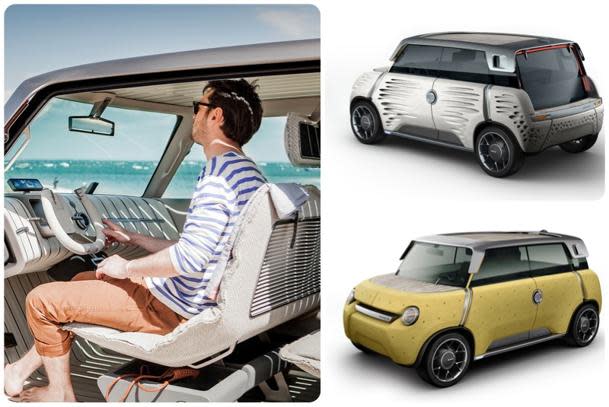 Motoramic
MotoramicToyota’s ME.WE concept sports light body, weighty conscience
The world's largest automaker worries the world has too many cars.
That's the only conclusion to draw from the latest concept car unveiled today by Toyota in Paris. Dubbed the ME.WE, and designed in a partnership with French architect/inventor Jean-Marie Massaud, Toyota calls the car an "anti-excess vehicle," designed to tread lightly on the environment with every touch of its electric-powered wheels. Toyota says the ME.WE suggests the future of transportation, which may make the present seem like a gilded age.
As described by Massaud, the idea behind the ME.WE was to build a vehicle that met as many of its owners' demands as possible without swaddling them in two tons of steel, leather and carbon dioxide that took more from the environment that it could ever replace. "For me, the car is symbolic of an age in which there is a plethora of things, in which everything is opulence," Massaud says. "We realize we are living outside of our real needs."
From that point, Toyota and Massaud designed an aluminium minicar frame with wildly adaptable shapes; it can transform into a pickup or convertible, and all of its windows, including the windshield, can be lowered for air flow. Power comes from lithium-ion batteries in the floor turning four electric motors in each wheel hub, giving it a modicum of four-wheel-drive off-road capability. By using bamboo for the floor and roof, and recycled polypropylene plastic for the body panels, the ME.WE weighs only 1,653 lbs.
Inside, there are two futon-like bench seats and a bamboo dash with a single small screen and phone port. The rear bench can come out for hauling cargo or use as a picnic seat; the entire car can be cleaned inside and out with a hose. And as Toyota's own renderings show, the stubby ME.WE's plastic panels that double as crash padding lend themselves to a Philippe Stark-with-Play-doh sculpting.
Officially Toyota does not recognize the irony of a company that sells 9 million new cars a year around the world, including its fair share of leather-lined opulence barges, suggesting that what the planet needs now is vehicles built from environmental guilt. But Toyota's correct that many modern cars offer more space, power and gadgets than many people ever use, and that even aside from environmental motivations there's latent demand for functional, efficient but unfussy transportation. If Toyota thinks the ME.WE can help the Earth and not just its corporate conscience, it should build more than just one.

 Yahoo Autos
Yahoo Autos 

